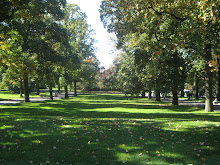
In the planning world, and pretty much everything else, growth is considered a good thing. Our economy needs to grow, our land use needs to grow, and even our bank accounts need to grow. Some people are starting to realize that all this growth is really just keeping our urban and rural populations in a state of paralysis. How can we continue to grow at our current rates, and why do we think growth is the answer?
Knute Berger over in Seattle is dealing with this very issue. Can Seattle and the region stay the way it is and continue it's current growth pattern? In hard times like now, growth is hailed as the cure to our illness.
But is growth unstoppable? And is it good for us, for the planet? Today's apostles of "smart" urban development argue that cities are environmentally the best route to take. They "prevent" sprawl, they use land and resources more efficiently, they reduce carbon footprints by putting more of us on mass transit or in walkable neighborhoods. Greens argue that growth is inevitable, so we'd better make it greener growth than we've had in the past.I have always questioned the growth is good argument, especially when it is bookmarked with sustainable growth. We are at a point in time were we will need some growth, but we have to ask the hard questions about this. Our density is increasing along with the populations that inhabit the same space. Our urban footprint continues to get bigger and bigger.
But growth here has also been the result of government policies, not simply the "free" market, or destiny or happenstance. From speeding up permitting by the county to increasing the heights of skyscrapers to issuing demolition permits and zoning variances, local officials work to encourage development, the answer to our prayers in hard times, the hay to be made in good ones.
Is it still in the public good? While many greens in Seattle push for more and better urban development and planning, there are many others who are concerned about growth's environmental and social costs to the city and the region. The way it disrupts settled communities, drives up costs, displaces the poor, increases taxes and the cost of infrastructure (consider the multi-billions being demanded for light rail, expanded bus service, a new SR 520, and a Viaduct replacement). Another concern is the way it keeps progress on sustainability out of reach. It's hard to reduce our impact on the planet with more and more people.
I am not sure what the solution is, but we need to start thinking in new terms and not accept sustainable growth as the great good is has been portrayed as.




No comments:
Post a Comment